By Elaine Viets

Long before “sugar daddy” was a popular term, rich, older men gave pretty young women money and expensive presents for companionship or sex.
Call them protectors, benefactors or Santa baby, sugar daddies have been celebrated in operas, pop songs, movies, and television.
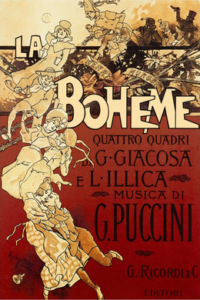
Puccini’s 1898 opera, La Boheme, has two sugar daddies. The Viscount is Mimi’s protector and rich, old Alcindoro keeps the brassy Musetta in fine clothes. Movies from “Breakfast at Tiffany’s” to “Pretty Woman,” are variations on the sugar daddy theme.

Where did the term come from?
The Ginger website says, “The word ‘sugar’ has been slang for money and luxury since the mid-19th century, and defines the nature of the relationship between the couple. The word ‘daddy’ was slang among prostitutes for an older man since the 16th century, and refers to the age difference between the two.
“Sugar daddy” has been used since the beginning of the 20th century, supposedly when Adolph Spreckels, heir to the Spreckel’s sugar fortune, married a woman 24 years younger, who called him “Sugar Daddy.”

That’s one theory, anyway. In the 1920s, a candy called Papa Sucker, (no, I’m not kidding) was born. In 1932, the sucker was renamed Sugar Daddy to suggest “a wealth of sweetness” according to Tootsie Roll Inc.
Yeah, right. I’ll ignore the fact that a Sugar Daddy is a sucker
The company didn’t try to explain the smaller, chewy Sugar Babies.
By that time, it was pretty clear that sugar daddy and sugar baby had nothing to do with candy.

About ten years ago, sugar daddies went online, and there are many sites where wealthy, older men can meet sweet young things. It’s called sugaring, or sugar dating. Some young women claim they’re sugar babies to pay for college, or enjoy luxury travel.
Is sugar dating prostitution?
Depends. A Texas law firm says, “Dating partners of all ages often exchange gifts or help each other with financial obligations. This does not break the law. However, many sugar baby relationships do blur the lines between relationships and prostitution. In Texas, it is illegal to offer sexual conduct for money. It is also illegal to pay a fee for sexual conduct.”

I use this modern twist on sugar daddies in “A Scarlet Death,” my new Angela Richman mystery. Selwyn Skipton, a rich, respectable old man, is found strangled on black satin sheets.
Turns out Selwyn had a secret life. He was a sugar daddy. Here’s a section from “A Scarlet Death” where death investigator Angela Richman tried to explain sugar dating to a sceptacal Det. Jace Budewitz. They are in a Chouteau Forest coffee shop, reading the late Selwyn’s computer files.

Jace brought another round of coffee, and we read in silence for about half an hour until I hit pay dirt. “Jace, you won’t believe this. Selwyn was a sugar daddy.”
“You mean like in the movies? A rich old guy who buys diamonds and gifts for pretty young women?”
“Sort of. Sugar daddies don’t have to wait by the stage door to pick up blondes any more. Now they can find them on the internet.”
“Of course they can,” Jace said.
“Selwyn used a site called DatingDaddies.com. From what I can figure out, he’s dated several sugar babies. The website says, ‘Sugar babies are young, attractive women paid to provide “companionship” to their daddy.’
“That word, ‘companionship’ is in quotes,” I added. “Here’s the rest: ‘Daddies may give their sugar babies presents or help pay their rent. The degree of intimacy is between the daddy and his sugar baby.’
“I can almost see the wink,” I said.
“Here’s an ad Selwyn saved for a sugar baby named Tammi.”
I read it out loud:
‘“I am twenty-one, a sweet, fun-loving business major. I want a Daddy with a kind heart. I prefer mature Daddies. I don’t smoke, but I do enjoy champagne and good conversation. Color me passionate about art. I love to talk about it, especially nineteenth-century artists. Or, if you want to have a quiet evening, Daddy, I’m a terrific listener. I’ll do my best to make you happy. I would love to find a business-savvy Sugar Daddy. In my free time I like to read and go for long walks.’
“Get this, Jace. Her username is Clover Honey.”
“Is this for real?” Jace asked. His eyes were round.
“Definitely. There are a zillion sugar baby websites. Tammi uses a pretty standard headline for her bio. It says, ‘Let’s have a secret.’ I see that one a lot.”
“What’s the difference between a sugar baby and a prostitute?” Jace asked.
“Not much,” I said. “But I’m old-fashioned. Sugar babies who charge outright often have ‘P2P’ in their ads. That means ‘pay to play.’ Most just want gifts or rent money.”
“If those men give their sugar babies money, that’s prostitution in my book,” Jace said.
“I’m not arguing with you, but sugar babies seem to be good at rationalization. Supposedly, many of them are college students trying to avoid student debt.”
“Right,” Jace said. “And strippers have hearts of gold and only take off their clothes to help their sick old mothers.”
Jace was usually more open-minded. I shrugged and said, “Just passing on the information.”
“Any photos of this Tammi sugar baby?”
“Yes, but her face is either hidden or in shadow in all three photos. In one photo she’s hugging a big chocolate Labrador, and all I can see is her long, blonde hair. In another, she’s wearing a teeny red bikini, and her face is shadowed by a big straw sunhat. In the third photo, she’s peering through palm tree fronds. About all I can see in any of the photos is long blonde hair, long legs and a big bust.”
“How can a sugar daddy make a decision, if he can’t see the woman’s face?”
“From what I’ve read, if a daddy is serious, the sugar baby will send photos so the man can see her face.”
Jace shook his head. “Sounds dangerous for both parties.”
“It is,” I said. “Sugar daddies have been blackmailed and some were murdered when they quit forking over cash. Sugar babies have been raped when they didn’t put out, and even killed.”
“That’s what I thought,” Jace said. “So these sugar babies have the same risks as hookers.”
“Seems like it. The sugar babies are paid well for it,” I said. “This file says Selwyn paid Tammi $85,000 in six months.”
Jace whistled. “I bet none of the women in the Forest are sugar babies.”
“Ha. You’d be surprised. I’m guessing some are. Sugar babies can be rich, bored, young women who want a short walk on the wild side, or their real daddies have cut off their allowance and the women want designer clothes.”
“That’s just greedy,” Jace said.
“May I ask why you seem to hate sugar babies?”
“I don’t hate them,” Jace said. “I have more respect for women who just say they’re sex workers. They don’t play games.”
What do you think about Sugar Daddies and Sugar Babies, TKZers?
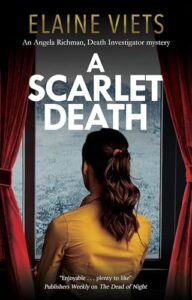
Reviewer Cynthia Chow calls my new Angela Richman mystery, “an outstanding procedural that depicts Angela’s death investigations while also delving deep into class structures and the behavior of the entitled.” Win a copy at Kings River Life. https://www.krlnews.com/2024/06/a-scarlet-death-by-elaine-viets.html



















 By Elaine Viets
By Elaine Viets





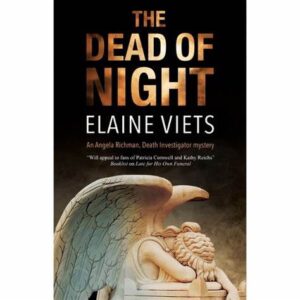 Stay smart and healthy! Enjoy The Dead of Night, my seventh Angela Richman, Death Investigator mystery.
Stay smart and healthy! Enjoy The Dead of Night, my seventh Angela Richman, Death Investigator mystery. 



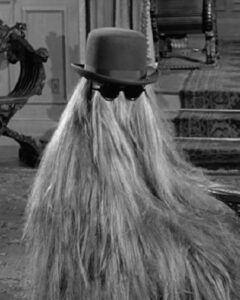


 See this woman? I’m sure you have. She’s been featured in a slew of ads. Aw, what a cute old lady.
See this woman? I’m sure you have. She’s been featured in a slew of ads. Aw, what a cute old lady.


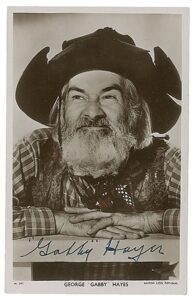

















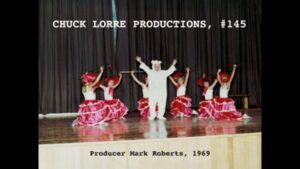
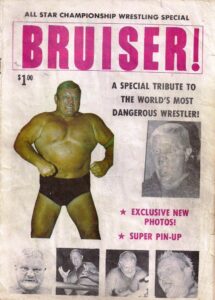
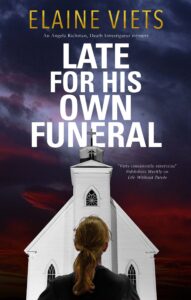
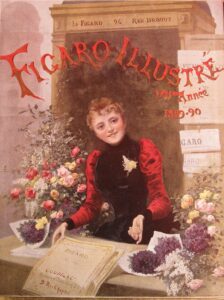


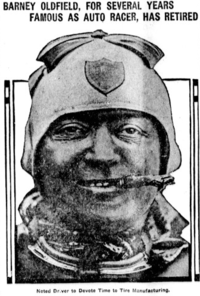







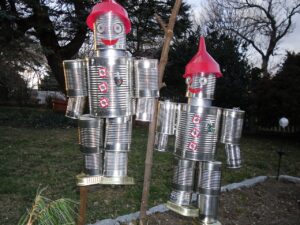

 I have no idea where Grandma got that phrase. I’m pretty sure she never listened to the southern rock band, Gov’t Mule. Or heard legendary wrestling commentator Jim Ross say someone was “being beat like a government mule.”
I have no idea where Grandma got that phrase. I’m pretty sure she never listened to the southern rock band, Gov’t Mule. Or heard legendary wrestling commentator Jim Ross say someone was “being beat like a government mule.”
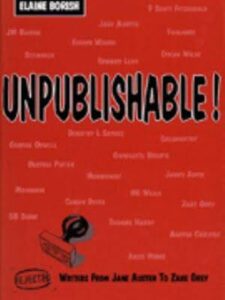
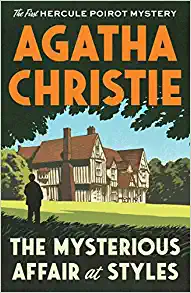
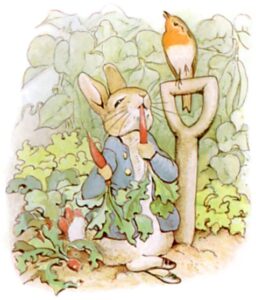
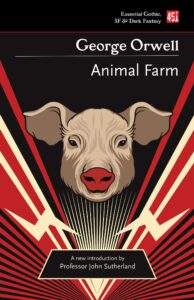 George Orwell had his masterpiece, “Animal Farm,” turned down by no less than T. S. Eliot, a big deal at UK publishers Faber and Faber. Like many in the upper echelons of publishing, Eliot missed the point when he rejected Orwell: “Your pigs are far more intelligent than the other animals, and therefore the best qualified to run the farm . . . What was needed (someone might argue) was not more communism but more public-spirited pigs.”
George Orwell had his masterpiece, “Animal Farm,” turned down by no less than T. S. Eliot, a big deal at UK publishers Faber and Faber. Like many in the upper echelons of publishing, Eliot missed the point when he rejected Orwell: “Your pigs are far more intelligent than the other animals, and therefore the best qualified to run the farm . . . What was needed (someone might argue) was not more communism but more public-spirited pigs.”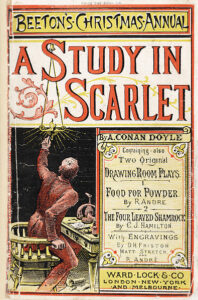 Publishers outdid themselves with boneheaded reasons to reject bestsellers. Conan Doyle’s first Sherlock Holmes novel, “A Study in Scarlet,” was turned down by the prestigious Cornhill magazine because it was too much like the other “shilling shockers” already on the market. The editor said it was too long “and would require an entire issue” – but it was “too short for a single story.” Another publisher sent the manuscript back unread. A third bought the rights for a measly twenty-five pounds, and let it sit around for year. It was published in 1887, and then brought out as a book, but Conan Doyle didn’t get any money from that because he’d sold the rights. Worse, the book was pirated in the U.S. Doyle wrote a couple of historical fiction works. Then an American editor, looking for UK talent, had dinner with Doyle and Oscar Wilde and signed them both up. Wilde wrote “The Picture of Dorian Gray” and Doyle did “The Sign of the Four.”
Publishers outdid themselves with boneheaded reasons to reject bestsellers. Conan Doyle’s first Sherlock Holmes novel, “A Study in Scarlet,” was turned down by the prestigious Cornhill magazine because it was too much like the other “shilling shockers” already on the market. The editor said it was too long “and would require an entire issue” – but it was “too short for a single story.” Another publisher sent the manuscript back unread. A third bought the rights for a measly twenty-five pounds, and let it sit around for year. It was published in 1887, and then brought out as a book, but Conan Doyle didn’t get any money from that because he’d sold the rights. Worse, the book was pirated in the U.S. Doyle wrote a couple of historical fiction works. Then an American editor, looking for UK talent, had dinner with Doyle and Oscar Wilde and signed them both up. Wilde wrote “The Picture of Dorian Gray” and Doyle did “The Sign of the Four.”